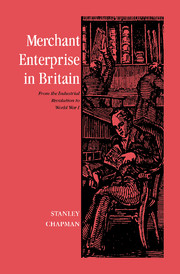Book contents
- Frontmatter
- Contents
- List of figures
- List of tables
- Preface
- Abbreviations used in the footnotes
- Introduction: approaches and concepts
- Part I The setting
- Chapter 1 The eighteenth-century structure of merchant enterprise
- Chapter 2 The consequences of the Industrial Revolution and the French Wars
- Part II New Streams Of Enterprise
- Part III Response to instant communication
- Part IV Conclusions
- Manuscript sources
- Index of firms and people
- Index of places
- Index of subjects
Chapter 2 - The consequences of the Industrial Revolution and the French Wars
Published online by Cambridge University Press: 20 March 2010
- Frontmatter
- Contents
- List of figures
- List of tables
- Preface
- Abbreviations used in the footnotes
- Introduction: approaches and concepts
- Part I The setting
- Chapter 1 The eighteenth-century structure of merchant enterprise
- Chapter 2 The consequences of the Industrial Revolution and the French Wars
- Part II New Streams Of Enterprise
- Part III Response to instant communication
- Part IV Conclusions
- Manuscript sources
- Index of firms and people
- Index of places
- Index of subjects
Summary
One of the features of the Industrial Revolution that has often been remarked on is the multiplication of the functions of entrepreneurs as merchants became manufacturers and financiers and manufacturers extended to importing, exporting, finance, landholding and other activities. This development increased the number of people engaged in trade and further blurred the traditional boundaries of mercantile enterprise. The increase of economic activity broadly coincided with long and difficult periods of war, notably those with the American colonists (1776–83) and with the French (1793–1815), which enervated or destroyed much hereditary enterprise and introduced some unprecedented opportunities for new firms. From this ferment there emerged an entirely new structure of mercantile enterprise and finance which lasted until the final quarter of the century. The process of restructuring forms the main subject matter of this chapter.
War, Trade And Enterprise
The American War of Independence and the French Wars coincided with the periods of major technical innovation and restructuring of the textile and iron industries of Britain. There was major interaction between the political and economic developments of the period and clearly one cannot be adequately understood without the other, but for the purposes of exposition it is convenient to consider them separately at this initial stage. Broadly speaking, war changed the composition of the merchant body by placing a premium on bold entrepreneurship and by the arrival of a new wave of refugees, while new industrial development changed the traditional functions of both merchant and manufacturer.
- Type
- Chapter
- Information
- Merchant Enterprise in BritainFrom the Industrial Revolution to World War I, pp. 51 - 78Publisher: Cambridge University PressPrint publication year: 1992



